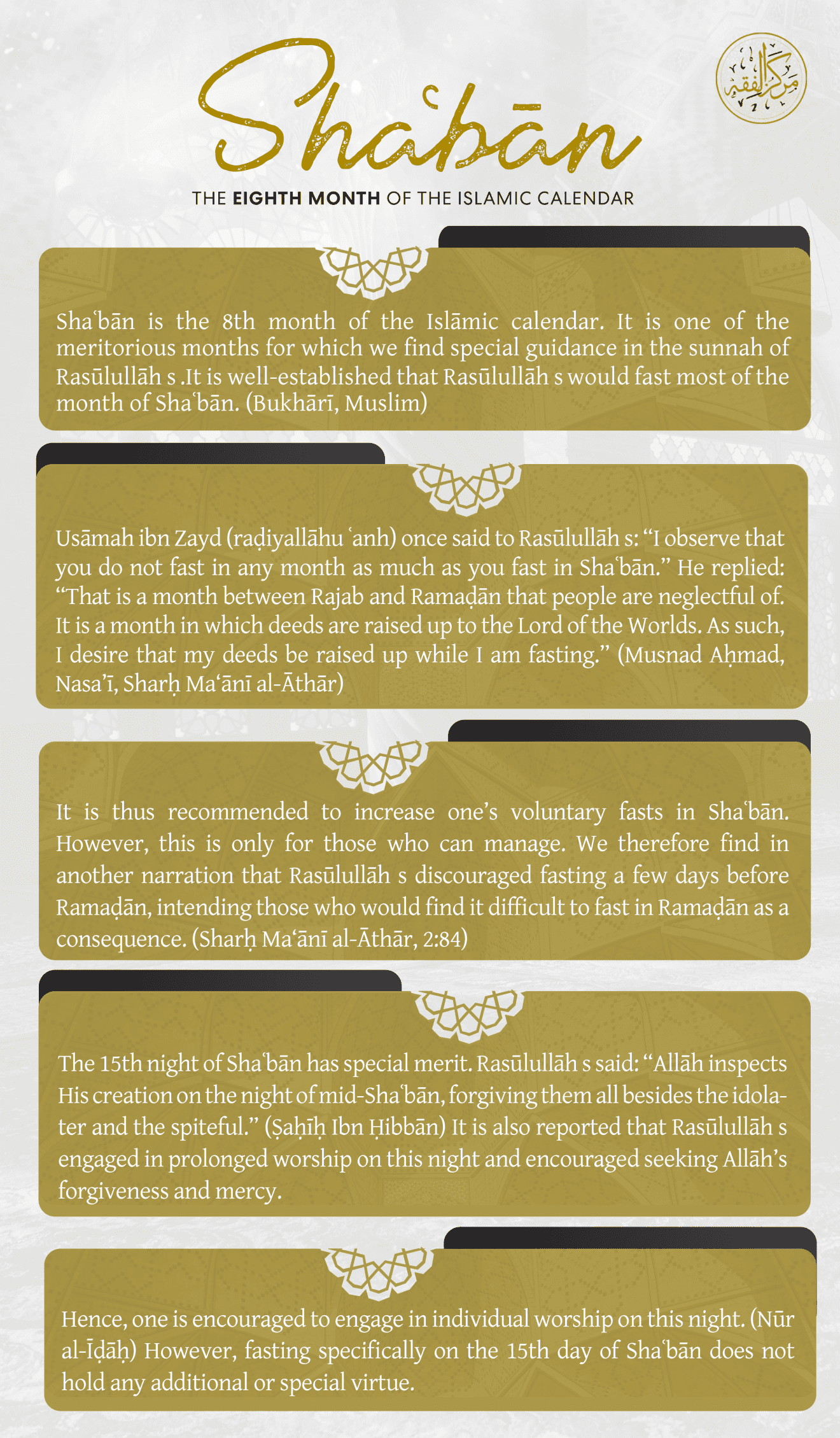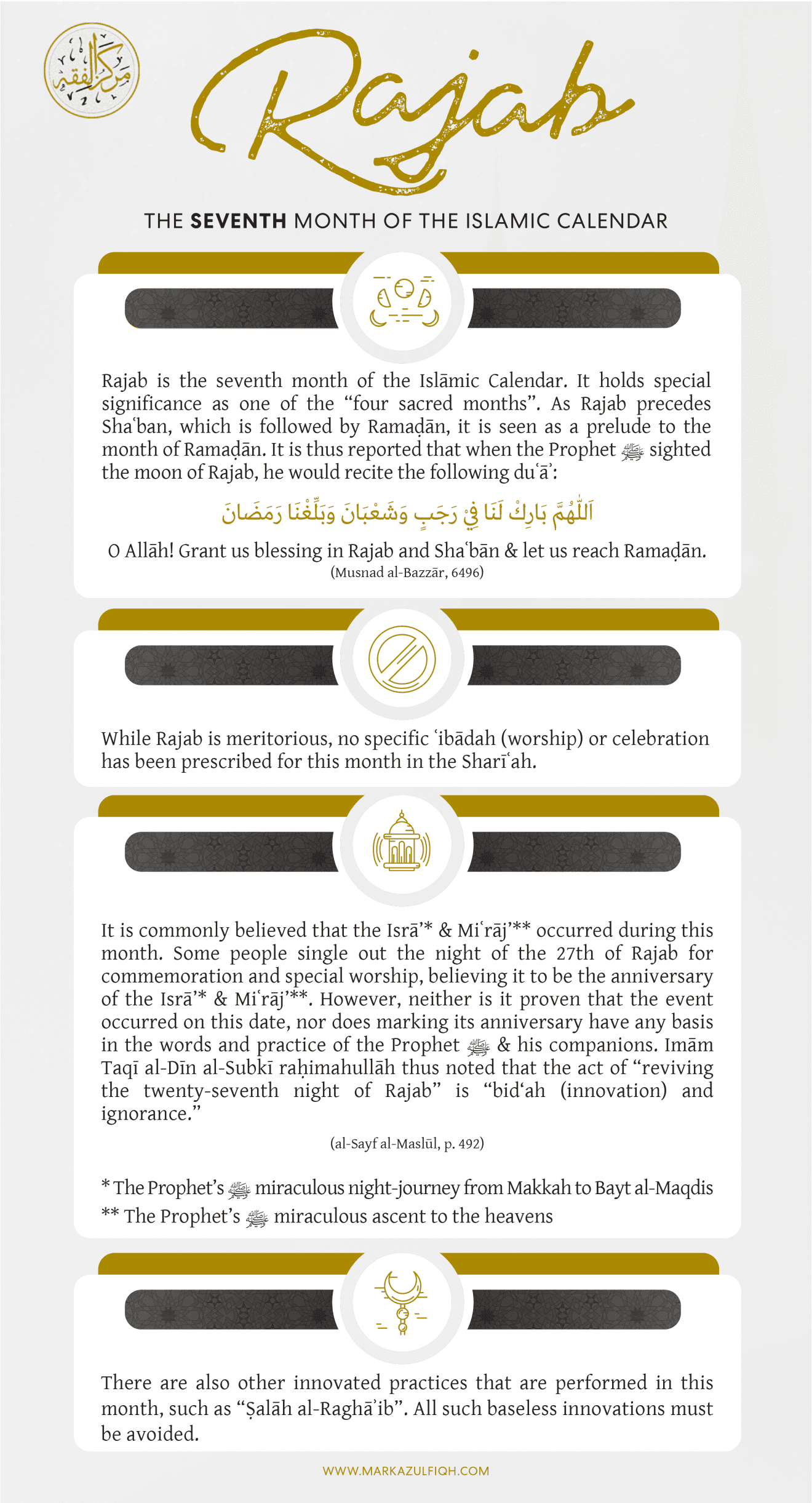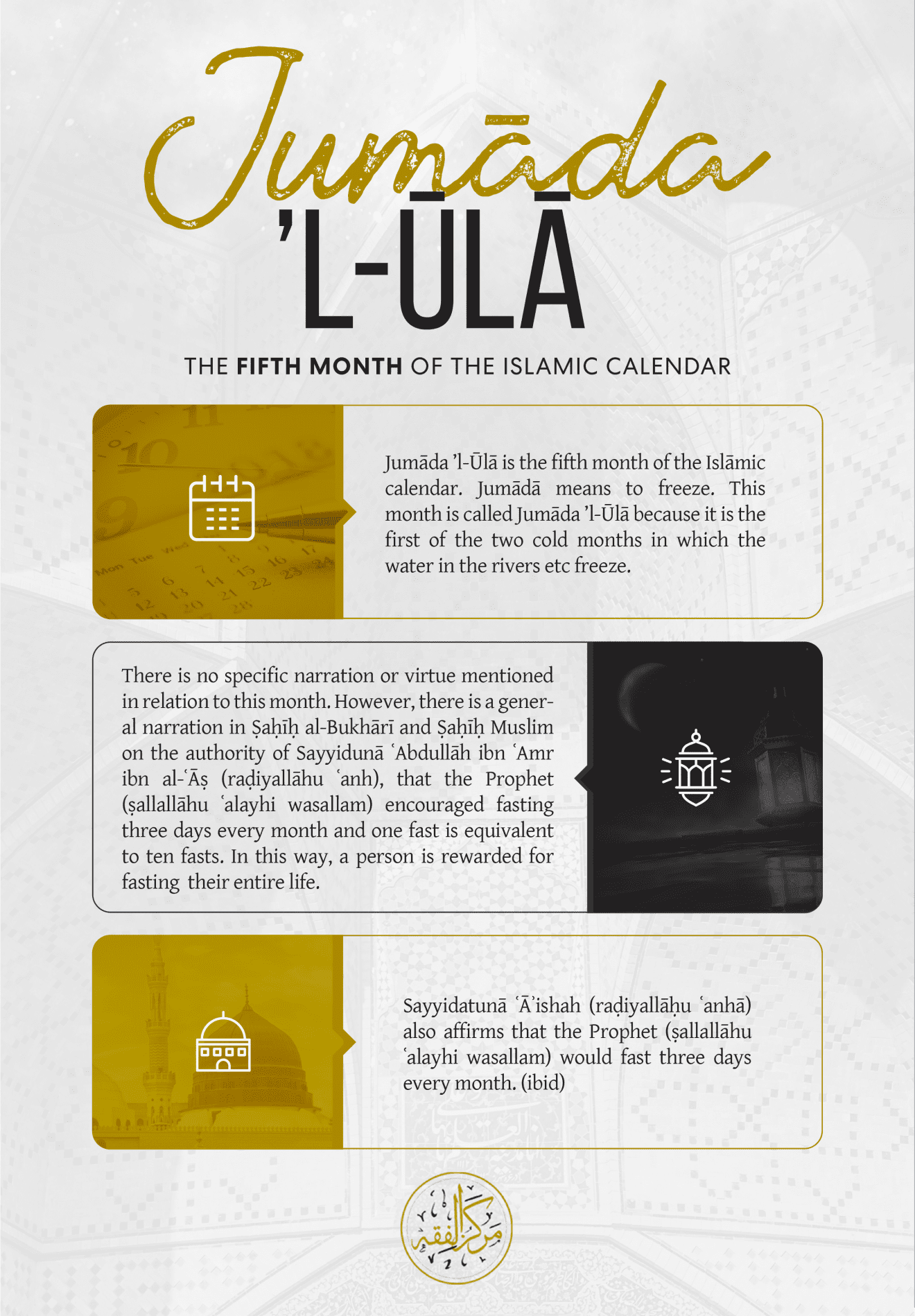Shaʿbān – The Eighth Month of the Islamic Calendar


By Hadhrat Mawlānā Muhammad Saleem Dhorat
With the advent of Rajab, the seventh month of the Islamic calendar, Muslims remember the great miracle of the Beloved Nabī of Allāh ta‘ālā, the Mi‘rāj, which is commonly believed to have taken place in this month. During this miracle, Rasūlullāh sallallāhu ‘alayhi wasallam travelled with his body and soul from Makkah Mukarramah to Baytul-Maqdis, and from there to the seven heavens and beyond and returned all in a split second.
The first part of the journey, from Makkah Mukarramah to Al-Masjidul-Aqsā, is called the Isrā and is mentioned in the Glorious Qur’ān. The second part of the journey, from Al-Masjidul-Aqsā to the heavens and beyond, is known as the Mi‘rāj. The great Mufassir ‘Allāmah Ibn Kathīr rahimahullāh has enumerated twenty-five Sahābah radhiyallāhu ‘anhum who have narrated this second part of the journey from Rasūlullāh sallallāhu ‘alayhi wasallam.
With regards to Mi‘rāj and the month of Rajab, let us keep the following points in mind:
Hāfiz Ibn Hajar Al-‘Asqalānī rahimahullāh, the commentator of Sahīhul-Bukhārī, has quoted more than ten different opinions for the possible date of Mi‘rāj. If this night was meant to be observed and spent in ‘ibādah, there would have been no difference amongst the Sahābah radhiyallāhu ‘anhum, for their ‘ibādah would have clearly defined the time of occurrence.
A faithful believer, while in salāh, converses privately with his Rabb… (Al-Bukhārī)
Allāh ta‘ālā says in a Al-Hadīthul-Qudsī:
‘I have divided the salāh (Sūratul-Fātihah) into two halves between Me and My slave; half is for Me and half is for My slave, and My slave will receive whatever he asks for.’ Rasūlullāh sallallāhu ‘alayhi wasallam said: Read (Sūratul-Fātihah)! (Because when) the slave says: ‘All Praise is for Allāh, the Rabb of all the worlds,’ Allāh ta‘ālā says: ‘My slave has praised Me.’ He (the slave) says: ‘The Most-Beneficent, the Most-Merciful,’ Allāh ta‘ālā says: ‘My slave has lauded Me.’ The slave says: ‘Owner of the Day of Recompense,’ Allāh ta‘ālā says: ‘My slave has glorified Me, and this coming verse is between Me and My slave.’ The slave says: ‘You (Alone) do we worship and from You (Alone) do we seek help,’ Allāh says: ‘This is between Me and My slave, and My slave will receive whatever he asks for.’ The slave says: ‘Guide us to the Straight Path, the path of those whom You have favoured, not of those who have incurred Your Displeasure nor of those who have gone astray,’ Allāh ta‘ālā says: ‘These are for My slave, and My slave will receive whatever he asks for.’ (Abū Dāwūd)
By understanding the position of salāh in Islām, one can conclude that only that person who values the gift of Mi‘rāj can truly claim to have understood Mi‘rāj.
When the month of Rajab would arrive, Rasūlullāh sallallāhu ‘alayhi wasallam used to make the following du‘ā:

Allāhumma bārik lanā fī rajabin wa sha’bān, wa ballighnā Ramadhān.
O Allāh! Grant us barakah in the months of Rajab and Sha‘bān and make us reach the month of Ramadān. (Al-Mu‘jamul-Awsat)
Therefore, it is desirable to recite this du‘ā on the advent of Rajab. Upon the commencement of Rajab, everyone should focus their attention on making preparations for the blessed month of Ramadān. This preparation is a spiritual one and entails fulfilling one’s duties to Allāh ta‘ālā, especially in areas where one is lacking.
Preparing for Ramadhān from the month of Rajab is just like getting into a car and putting it in first gear. Begin to observe the compulsory and obligatory acts from now so that by the time Ramadān sets in, you are in fifth gear practising many optional acts of worship as well.
May Allāh ta‘ālā give us the tawfīq to practise upon His entire Dīn according to the teachings of our Beloved Nabī sallallāhu ‘alayhi wasallam, and may He enable us to start making preparations for the month of Ramadhān from now. Āmīn.
Extracted from ‘Inspirations’ (Part 1)
Source: At-Tazkiyah

The Qurʾān is the sacred and divine speech of Allāh. It has always been a source of benefit and inspiration for its reciters. There are numerous accounts of individuals affected by the Qurʾān in a positive and profound way. We Muslims are extremely fortunate that the Qurʾān was revealed for us. Apart from showing us truth from falsehood and the right path from the wrong, the Qurʾān is a means of attaining blessings, closeness to Allāh and gaining rewards and benefits. It is indeed very unfortunate that we have become distanced from the Qurʾān.
The following verse and narrations explain the importance and virtues of reciting the Qurʾān:
Allāh Taʿālā states in the Holy Qurʾān:
الَّذِينَ آتَيْنَاهُمُ الْكِتَابَ يَتْلُونَهُ حَقَّ تِلَاوَتِهِ أُولَئِكَ يُؤْمِنُونَ بِهِ وَمَنْ يَّكْفُرْ بِِه فَأُولَئِكَ هُمُ الْخٰسِرُون
“Those to whom We have given the Scripture and they recite it observing the rights of its recitation – those are the ones who (truly) believe in it. Those who disbelieve in it (by not observing its rights), those are the losers.” (al-Baqarah: 121)
“Observing the rights of its recitation” means, according to ʿAbdullāh ibn Masʿūd (raḍiyallāhu ʿanh): “To treat what is lawful in it as lawful and what is unlawful in it as unlawful and recite it as revealed by Allāh and to not alter the words from their places, nor explain anything from it against its correct explanation.” (Tafsīr Ibn Kathīr, 2:45) Those that do not observe the rights of the Scripture in this manner are described as having “disbelieved” in it, and therefore “losers” i.e. dwellers of Jahannam. (Tafsīr al-Jalālayn, p.59)
Abū ʿAbdir-Raḥmān al-Sulamī narrates from Sayyidunā ʿUthmān (raḍiyallāhu ʿanh) that Rasūlullāh (ṣallallāhu ʿalayhi wasallam) said: “The best of you are those who study the Qurʾān and teach it.” (Bukhārī)
It is reported from ʿĀʾishah (raḍiyallāhu ʿanhā) that Rasūlullāh (ṣallallāhu ʿalayhi wasallam) said: “The one who is proficient in the recitation of the Qurʾān will be with the honourable and obedient messengers (angels) (i.e. in degree), and he who recites the Qurʾān, repeating its (words) because he finds it difficult, will receive two rewards.” (Muslim)
From the above narration we understand that if one struggles to recite the Qurʾān fluently, but he puts in the effort and works on improving his recitation, he shall receive double reward. Hence, one should not become discouraged from reciting the Qurʾān on account of not being able to recite with ease.
ʿAbdullāh ibn Masʿūd (raḍiyallāhu ʿanh) reports that Rasūlullāh (ṣallallāhu ʿalayhi wasallam) said: “Whoever recites a letter from the Book of Allāh will be credited with a good deed, and every good deed is multiplied by ten. I do not say that Alif-Lām-Mīm is one letter, but Alif is a letter, Lām is a letter and Mīm is a letter.” (al-Tirmidhī)
Abū Umāmah al-Bāhilī (raḍiyallāhu ʿanh) narrates that he heard Rasūlullāh (ṣallallāhu ʿalayhi wasallam) say: “Recite the Qurʾān, for on the Day of Resurrection it will come as an intercessor for those who recite it. Recite the two shining sūrahs: al-Baqarah and Āl ʿImrān, for on the Day of Resurrection they will come as two clouds or two shades, or two flocks of birds in ranks, pleading for those who recite them.” (Muslim)
May Allāh Taʿālā make us from amongst those who recite the Qurʾān regularly and correctly, and strive to understand its message and follow its guidance. Āmīn.
Bilal al-Mahmudi

Subscribe to our mailing list and receive the latest posts directly to your inbox.